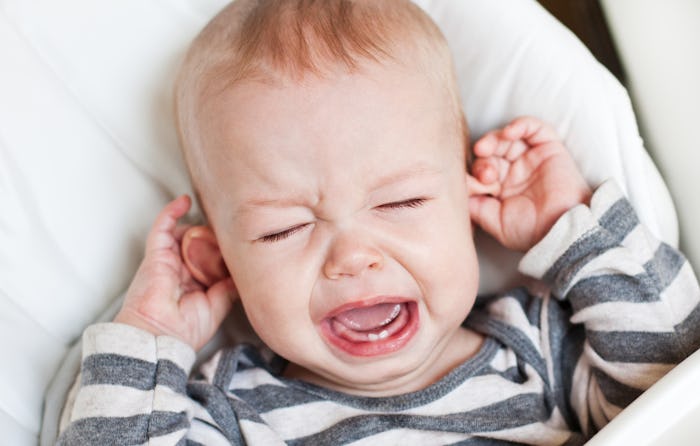Life

Here's How You Can Tell If Your Baby's Pain Is From Teething, According To Pediatricians
Moms and dads everywhere cringe when they think about the tender little mouth of their pride and joy being poked through with a sharp tip — teething is the unifier of every parent in the world and often the bane of their existence. But sometimes it can be hard to tell what's going on with your nonverbal cuties: Is the fussiness really due to new teeth? Is my baby in pain from teething, or is it something else entirely? Two doctors make it easier to detect.
In an exclusive interview, pediatrician Dr. Jarrett Patton of Pennsylvania tells Romper, "Teething symptoms can begin early in life, although the first teeth aren't visible until around 9 to 12 months of age. Often parents confuse the oral fixation phase of infants, around 2 months of age, with teething because of the desire of the infant to put things in their mouth and the excessive drool. As they age, the symptoms improve until they are truly teething. You may notice gum swelling, drooling, a change in stool habits, sleep disturbances, fussiness, or they may feel warm. If you notice a combination of these symptoms in the 5 to 10-month-old time frame, your baby is likely teething."
Dr. Danielle Fisher, chair of pediatrics at Providence Saint John's Health Center in Santa Monica, agrees that looking for the right symptoms is key. "A low grade fever (less than 101 degrees Fahrenheit) may be a sign of teething, but any fever that persists above that level for more than 24 hours is likely not due to teething. Babies with teething may have a mild, clear runny nose, but discolored mucus is not a sign of teething." She adds that teething babies may also experience poop that is slightly more runny than usual, along with a mild diaper rash, and that they may be fussy or not eat as well as usual, "but these symptoms are mild. For any symptoms that are not mild or last longer than 24 hours, consult your pediatrician."
According to Fisher, teething pain is subjective, so some babies will experience a great deal of teething pain while others do not. Fisher recommends keeping teething rings or washcloths on hand in the refrigerator (the freezer makes them too cold, she advises) and if a baby appears to be in significant discomfort, don't hesitate to offer acetaminophen if you've checked the dosage with your doctor. Teething is no joke, but one day you'll be happily chowing down on a burger and fries together, because — contrary to what it seems right now — they really do grow up.